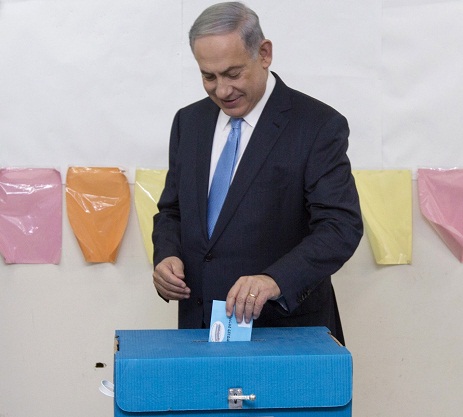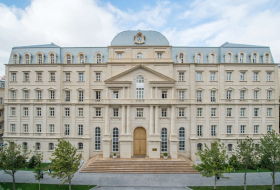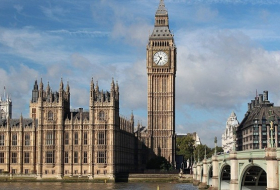That was underlined on the eve of the polls when Israel’s Netanyahu unequivocally ruled out the establishment of a Palestinian state as he vowed to strengthen construction of settlements in occupied east Jerusalem should he be re-elected.
Polling stations opened at 7am with the first exit polls due to be published at 10 pm (8pm GMT) this evening ahead of the publication of official results next week at the beginning of efforts to form a coalition government.
Election analysts are predicting one of the largest turn outs since 1999 with up to 80 percent of eligible Israelis expected to vote.
Netanyahu’s comments reinforced his hardening message of recent days and confirmed the final abandonment of his at best tepid commitment to a two-state solution designed to see the creation of an independent Palestinian state.
His remarks were made in an interview with a website owned by US casino magnate Sheldon Adelson - Netanyahu’s biggest backer - and were being viewed by his political opponents as a last-ditch effort to sway voters away from the rival far-right Jewish Home party of Naftali Bennett.
“I think that anyone who moves to establish a Palestinian state and evacuate territory gives territory away to radical Islamist attacks against Israel,” Netanyahu said. “The left has buried its head in the sand time after time and ignores this, but we are realistic and understand.”
When asked if that meant a Palestinian state would not be established if he is elected, Netanyahu replied: “Indeed.”
While his remarks will be seen in large part as election rhetoric designed to cement his standing with his country’s hard right at a time when Netanyahu has been struggling in his campaign, they will further strain relations with the US and other key allies should he win a third consecutive term.
Netanyahu’s remarks signalled the most comprehensive rebuttal of his 2009 Bar-Ilan speech when he committed himself to a two state solution and the creation of a Palestinian state.
He added “You can’t carry out the things that were laid out in the Bar Ilan speech... when all you have on the other side is terror. There are no forces for peace, no partner for peace,” he said.
Netanyahu has gone into the campaign, called in early December, as the clear favourite to win but has struggled with a weak campaign and in the face of an unexpectedly strong challenge from Herzog who has campaigned largely on the social and economic issues Israelis have made clear matter most to them.
Editorials in Tuesday morning’s Hebrew press called on Israelis to vote with the left leaning Haaretz encouraging its readers to vote Netanyahu out of office.
“Today’s election is a genuine opportunity to change the depressing direction in which Israel is headed,” said the newspaper. “In his past six years in power, Prime Minister Benjamin Netanyahu demonstrated absolute impotence and Israel declined in nearly every possible respect.”
Citing both a worsening security and economic situation it added : “Under Netanyahu, laws that are intolerant, antidemocratic and incite to ethnic hatred have proliferated. Senseless programmes to reinforce Jewish identity, chief among them the “Jewish nation-state bill,” underlined his efforts to further marginalise Israel’s minorities and make them second-class citizens.
In the last two days of the campaign Netanyahu has tacked sharply right in a effort to secure re-election, addressing a rally in Tel Aviv organised by hardline pro-settlement activists and visiting the settlement at Har Homa in occupied east Jerusalem.
The final opinion polls – released on Friday ahead of a four-day moratorium on publishing surveys of voter intentions – put the centre-left Zionist Union, headed by opposition leader Yitzhak Herzog and former peace negotiator Tzipi Livni, ahead with 25 to 26 seats, and Netanyahu’s Likud taking 20 to 22 in the 120-seat Knesset.``
Amid warnings from Netanyahu to his supporters that he risks being voted out as prime minister – and his claims of the existence of a well-funded conspiracy involving Israeli leftists and foreign governments to depose him – Likud has spent the past few days targeting those intending to vote for the rival right-wing parties.
At stake – according to Israeli analysts – are a handful of seats that many believe could define the outcome of an election too close to call.
Visiting his party headquarters, an upbeat Herzog talked about a “crucial” vote for the country and warned against splitting the anti-Netanyahu vote among the various centrist parties, including charismatic leader Yair Lapid’s Yesh Atid Party.
“Whoever wants an upheaval has to vote for us,” he added.
Since its first election in 1949 no Israeli party has won an outright majority and the complexities of its electoral system mean that often the leader who can assemble the most stable coalition – not necessarily the party with the most seats – gets to form a government.
While polls suggest that Netanyahu might find it easier to assemble more mandates for a right-wing coalition, this election – called in early December – has a number of new variables including the emergence of a new centre-right party, Kulanu, whose leader Moshe Kahlon, a former Likud minister, has kept a close counsel over whom he might back for prime minister.
On Sunday, Netanyahu offered Kahlon the finance portfolio to Kahlon, who immediately dismissed the overture as “spin”.
Two other small parties – the leftwing Meretz and Yisrael Beiteinu, led by rightwing foreign minister Avigdor Lieberman – stand on the verge of failing to make the electoral threshold for representation, which could also affect the outcome.
More about:
















































